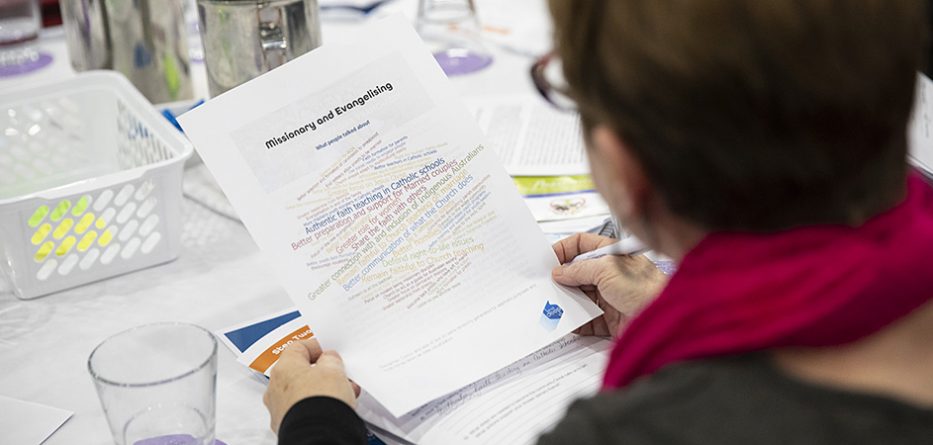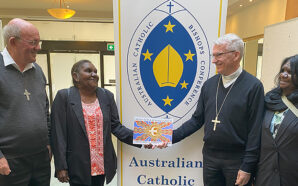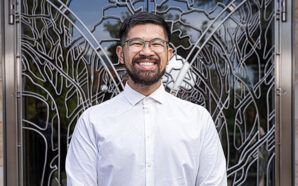Plenary Council Participation and Reception: Synodality and Discerning the Sensus Fidelium
By Reverend Associate Professor Ormond Rush
Only if a “spirituality of synodality” is operating in the minds and hearts of the Australian faithful (laity and bishops) throughout the preparation, celebration, and implementation of the 2020 Plenary Council, will a deep listening to the Spirit of God take place. If there is a genuine appreciation of the “polyhedron” which is our multi-faceted Australian Catholic community, and if all participants at all levels in the nationwide listening process embrace Pope Francis’ synodal virtues (to express with honesty and boldness what is in my heart, but likewise to listen with respect and openness to the bold honesty of others), then we will avoid ideological culture wars and listen together to “what the Spirit is saying to the churches” of Australia.
With such a spirituality, when the Plenary Council is over and done, and final decisions have been made for the future of the Australian churches, each and every person who has taken up the opportunity to express their “sense of the faith” should be able to say: “I have had an opportunity to have my say, without reservation, and I must say that I have been listened to with genuine respect by my sisters and brothers of whatever ideological stripe. And I, with genuine respect, have truly tried to listen to the other voices from the polyhedron, open to the possibility that their sensus fidei, coming from the same Spirit as mine, might just be a necessary uncovering of the blind spots in my own perspective. The Plenary Council has been for me an experience of the wondrous workings of the Holy Spirit, who blows where she wills, and I accept as coming from God what the Plenary Council has decided.”
For Pope Francis, such synodal listening doesn’t only have consequences for the dynamism of the church’s inner life. For him, it is not just about navel-gazing. Becoming a synodal church ad intra, he believes, is necessary in the church’s outreach ad extra. It is an important dimension for demonstrating the church’s credibility as it prophetically and provocatively reaches out in mission. At the very end of his October 17, 2015 address, the pope concludes with a vision of a missionary and prophetic church turned ad extra:
Our gaze also extends to humanity as a whole. A synodal Church is like a standard lifted up among the nations in a world which—while calling for participation, solidarity and transparency in public administration—often consigns the fate of entire peoples to the grasp of small but powerful groups. As a Church which “journeys together” with men and women, sharing the travails of history, let us cherish the dream that a rediscovery of the inviolable dignity of peoples and of the function of authority as service will also be able to help civil society to be built up in justice and fraternity, and thus bring about a more beautiful and humane world for coming generations. [21]
In other words, listening to the sensus fidelium within the church (ad intra) is vital for the success of the church’s mission in the world ad extra.
Synodality, and attention to the sensus fidelium, is, of course, just one dimension of Francis’ fuller vision for the church ad intra and ad extra, a vision that calls for deep conversion in all areas of the church’s life and mission. In terms of the church ad extra, Francis speaks of a missionary conversion, of an ecumenical conversion, of an ecological conversion. In terms of the church ad intra, he has called for a mercy conversion, conversion to a church of the poor, and now for, what we might call, a synodal conversion. It is just one part of the picture. But it is vital. And, if we really believe in a Trinitarian church and the equally vital role of the Holy Spirit in all dimensions of the church’s life, at the heart of this vision of a synodal, listening church is the special gift which the Holy Spirit bestows on all the faithful, the sensus fidei—the means through which the Spirit whispers guidance to the church, above all to the pope and bishops, on its mission in a complex world.
To read part four, click here.
Fr Ormond Rush is a priest of the Diocese of Townsville, and lectures in theology at the Brisbane campus of Australian Catholic University (ACU).
This paper originally appeared in Edition 27 of the Plenary Post from the Plenary Council 2020. Reproduced with permission.
[21] Address at the 50th Anniversary of the Institution of the Synod of Bishops, http://w2.vatican.va/content/francesco/en/speeches/2015/october/documents/papa-francesco_20151017_50-anniversario-sinodo.html.








